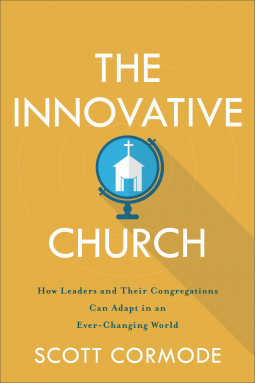
The Innovative Church
How Leaders and Their Congregations Can Adapt in an Ever-Changing World
by Scott Cormode
This title was previously available on NetGalley and is now archived.
Send NetGalley books directly to your Kindle or Kindle app
1
To read on a Kindle or Kindle app, please add kindle@netgalley.com as an approved email address to receive files in your Amazon account. Click here for step-by-step instructions.
2
Also find your Kindle email address within your Amazon account, and enter it here.
Pub Date 15 Sep 2020 | Archive Date 20 Nov 2020
Baker Academic & Brazos Press | Baker Academic
Talking about this book? Use #TheInnovativeChurch #NetGalley. More hashtag tips!
Description
Advance Praise
“Scott’s thoughtful and practical insights on innovation have helped countless churches and ministry organizations. Now they can impact yours as well. He is a reliable voice and trusted resource for all leaders who want to bring adaptive change to the people and contexts they serve. Trust me, you’ll keep this book close and refer to it often!”—Kara Powell, executive director, Fuller Youth Institute; coauthor of Growing Young and Growing With
“Scott Cormode incorporates Scripture, practical theology, personal stories, real-life church examples, and the best learning on creativity and leadership from the world around us in order to help congregational leaders recalibrate the church for a world that has changed. The sections on empathetic listening alone are worth the price of the book. Church teams will find this both readable and challenging. I will be using it in my leadership class with seminarians.”—R. Robert Creech, Hubert H. and Gladys S. Raborn Professor of Pastoral Leadership, director of pastoral ministries, George W. Truett Theological Seminary
“With The Innovative Church, Scott brings road-tested research to bear in a practical and insightful guide to innovative change within the twenty-first-century church. For any leader who longs to see the church not just survive but thrive amidst the rapid pace of cultural shifts, start with this book.”—Jill Ver Steeg, chief operating officer, Reformed Church in America
“We live in a moment when the need for churches to innovate has become undeniable. Yet that innovation must carry forward the best of Christian traditions so that they might faithfully offer life, hope, and healing to the world today. This book distills enormous wisdom in an accessible and practical, yet intellectually rigorous, guide for all those seeking to lead the church to adapt and flourish in trying times. Scott Cormode speaks to the heart of the challenges facing the church and offers hopeful ways forward.”—Dwight Zscheile, vice president of innovation and associate professor of congregational mission and leadership, Luther Seminary
“In recent memory, no book has been so timely as The Innovative Church. In the face of social upheaval, as demonstrated by such challenges as a pandemic and racism as unfinished business, the mainline Christian church needs to hear concepts and strategies not solely on innovation but also on our basic human experiences of ‘longings and losses’ that just may propel us to a way forward. Drawing on deep theological and biblical groundings, Cormode provides a field-tested method for innovation to emerge for our churches. This is a must-read book if we are to break the downward malaise that we are currently experiencing and emerge from our present crises with a future of hope.”—Bishop Grant Hagiya, resident bishop of the Los Angeles Area of the United Methodist Church
Available Editions
| EDITION | Other Format |
| ISBN | 9781540962263 |
| PRICE | $27.99 (USD) |
| PAGES | 304 |
Average rating from 4 members
Featured Reviews
I was relieved when I saw a title like this offered. The church as we know it has to change and adapt, and it was refreshing to see a book written about that topic! Cormode offers deep insights from his own experience which I found really valuable.
“The Innovative Church” by Scott Cormode brings to question how the church should continue to innovate, while maintaining the core values. Many churches fear or fight change, but Cormode argues that innovation is inevitable, it’s up to leaders how the innovation goes.
Leaders are called to listen. Congregations are full of people who have longings and losses and if a church leader is listening, they will hear what these things are. If the church is called to serve its congregation, then these longings and losses should be the first things a church aims to heal. But often we miss the mark because we don’t want to change beyond how we’ve always done things. Through stories, experiments, candor, and other techniques church leaders can find ways to innovate and thrive.
One of the biggest takeaways I had from this book is story telling. Humans deal with the world through stories, so it’s not surprising that the church is fluent in stories. But often we see the example of Jesus changing the story. Mental models are the things we use to make sense of the world, so the job of stories is to shift mental models into a new way of thinking. This is what the church must do when they innovate. Take a common mental model and use storytelling to shift the old model to the new. The new idea may not initially take, but if the leader continues listening and trying new ideas, the innovation will come and serve the church well.
Overall, I found this book extremely interesting. I’ve been in a variety of churches over the years and it’s true many churches can become rigid or unwilling to grow. It takes a leader to shift the story and create the direction, but it also takes a congregation who is willing to lose what is comfortable or what is common. Innovation is necessary, but who is willing to innovate? I gave this book 4 stars.
 Joan N, Reviewer
Joan N, Reviewer
Cormode argues that the church is not doing a good job today. “The church as we know it is calibrated for a world that no longer exists.” (372/869) The way church is done is based on a model centuries old. “The world has changed, but the church has not.” (21/869) In the past, the church has had decades to adapt to cultural change. That strategy will no longer work, Cormode writes. The church must be innovative while still being grounded in the gospel.
How the church can be innovative has been the focus of Cormode's study for years. He has tested and refined ideas he provides in this book. He writes about the mental models we have of how church should be and how they can be changed. He advocates listening to people and their needs and listening to God in expectant silence. “This listening precedes all action.” (148/869) He advocates innovation within traditions. He says such innovation requires discernment. The best leaders let the people think for themselves and provide for them the tools needed, giving the work back to the people.
The good news is that Cormode has provided a great blueprint for churches to change and be effective in the current culture while maintaining an emphasis on the gospel and valuing traditions. The bad news is that this book is way too much. I would usually recommend a book like this to board members but I doubt many would read a book this complicated and long. There is just too much philosophy of change and too many examples in this book. (Did we really need to know all about the pitch for Finding Nemo?) (531/869) I would suggest a student of Cormode create a twenty page synopsis of this book that would be read and used by lay people. The material in this book is too important to be relegated to seminary classrooms.
I've been through church changes, some effective and some painfully disastrous. Cormode has nailed many important issues like addressing the pain and feelings of loss from change. Another important point is that leaders must have the authority to inspire change, not by position but by earning the love and trust of people in the congregation. Such valuable insights!
I highly recommend this book. It contains so many insights into how the church can be effective in an ever changing culture while maintaining the never changing gospel. Perhaps one person on the church board could wade through the book's material and present it more concisely to others. Cormode notes that “seminary education is calibrated for a world that no longer exists...” (640/869) Likewise, this book is calibrated for a reading public that no longer exists. The material in it is so important, it needs to be represented in a different way to have an impact on the current Christian culture.
I received a complimentary egalley of this book from the publisher. My comments are an independent and honest review.
 Jason S, Reviewer
Jason S, Reviewer
Scott Cormode offers a story-filled book to help the local church reclaim the ancient traditions of the church as it replaces traditionalism with innovation. This will be an essential tool for the church. Cormode balances the academic and research with the practical and story. In doing so, he motivates the local church to change the mental models of old to embark on a new thing.






